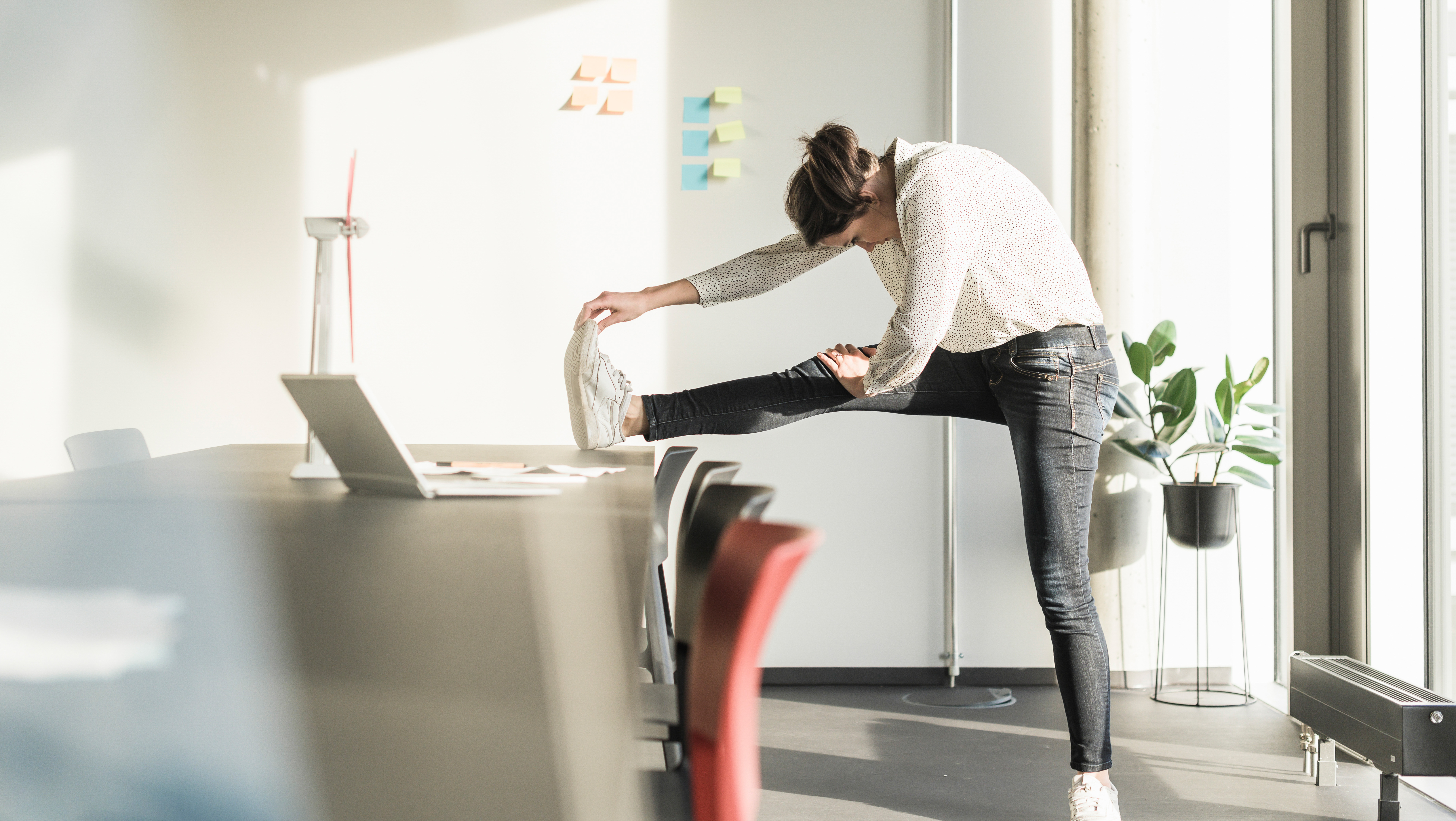Feeling stiff after a day at your desk? A physical therapist recommends these four stretches to help you bounce back
Simple exercises to ease pain


After a day at the desk, you might notice aches and pains in your back, shoulders and hips. If you stand up and try to touch your toes, you might also find that the muscles running along the back of your thighs (your hamstrings) feel pretty tight too.
"Prolonged sitting or long periods of inactivity can lead to tightness as the hamstrings remain in a shortened state. They can get tighter the more you sit," explains Dr Milica McDowell, a doctor of physical therapy and certified physiologist at Gait Happens.
Having tight hamstrings can limit movement in your hips and knees, making everyday activities such as walking or even taking the stairs a struggle. It can also create a posterior tilt in your pelvis and cause lower back pain.
McDowell explains that not incorporating enough stretching into your routine can prevent the hamstrings from maintaining their elasticity. She suggests doing five minutes of light movement such as power walking or jogging, then doing the four below stretches once your muscle tissue is warm.
1. Standing pelvic tilt
- Stand with feet under your hips; imagine you're wearing a huge championship belt with a large buckle.
- While standing, tilt your imaginary belt buckle toward the floor, then come back to neutral, and then tilt your belt buckle toward your chin. The movement should come from your pelvis; try to limit movement in your ribs and torso.
How it helps
"This is an anterior [front] and posterior [back] pelvic tilt. This movement can help to unlock your pelvis and will allow your hamstrings to lengthen," explains Dr McDowell.
2. Elevated hamstring stretch
- Stand upright and place your right heel on a bottom stair or slightly elevated surface, keeping your right knee straight and right hip back.
- Lean forward over your right leg with your back flat, looking toward your toes. You'll feel a gentle stretch in your hamstring and into the lower glute area.
- Stay in this position for 20 to 60 seconds and do it two to three times on each side.
How it helps
Start your week with achievable workout ideas, health tips and wellbeing advice in your inbox.
This is a great stretch to help alleviate tightness in the hamstrings and can be done on a step, stair or curb. To deepen the stretch, heighten the step.
3. Forward fold
- Stand upright with feet hip-width apart and softly bend your knees.
- Reach your hands down to the floor, keeping your knees bent. Fold your torso toward your thighs. Relax into this position.
- If you have good hamstring flexibility, you can gently start to straighten the legs and contract your quads.
- Hold for four to five breaths. Repeat three times.
How it helps
This will stretch and lengthen the hamstrings. This move allows for progression as your flexibility improves; you can start by practicing with bent knees then straighten your legs once you're feeling more limber.
4. Dynamic hamstring march
- Stand upright with your arms out in front of you at shoulder height.
- Walk forward slowly and kick your legs straight in front like you are trying to touch your toe to your outstretched hand.
- If this is a struggle, start with kicking up to hip height, still holding your arms out in front.
How it helps
Not only does this help to alleviate hamstring tightness, but it’s an ideal movement to do before exercise. Dr Mcdowell adds that you’ll also get a little cardio and balance boost by practicing this move too.
Try combining the above moves with hip stretches, hip-strengthening exercises and spinal mobility yoga moves like cat-cow to help your body recover after sitting.
What causes tight hamstrings?
When we sit, our hamstring muscles are forced into a shortened position. If we do a lot of sitting the muscles can become permanently shortened, which is a process known as adaptive shortening.
That's not the only possible cause of hamstring tightness. Injury, exercise, overuse and muscle imbalances could also be to blame.
"When the quadriceps [front thigh muscles] are significantly stronger than the hamstrings, it can lead to tightness and imbalance. Weak gluteal muscles can also cause the hamstrings to overcompensate, leading to tightness and strain," adds Dr McDowell.
Having weak gluteal muscles is another symptom of too much sitting. To combat this, try learning how to squat or have a go at the moves in our round-up of the best glute exercises.
Lucy is a freelance journalist specializing in health, fitness and lifestyle. She was previously the Health and Fitness Editor across various women's magazines, including Woman&Home, Woman and Woman’s Own as well as Editor of Feel Good You. She has also previously written for titles including Now, Look, Cosmopolitan, GQ, Red and The Sun.
She lives and breathes all things fitness; working out every morning with a mix of running, weights, boxing and long walks. Lucy is a Level 3 personal trainer and teaches classes at various London studios. Plus, she's pre- and post-natal trained and helps new mums get back into fitness after the birth of their baby. Lucy claims that good sleep, plenty of food and a healthy gut (seriously, it's an obsession) are the key to maintaining energy and exercising efficiently. Saying this, she's partial to many classes of champagne and tequila on the rocks whilst out with her friends.
